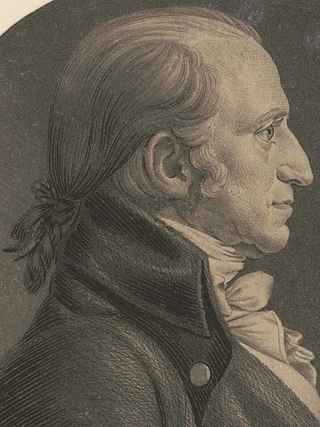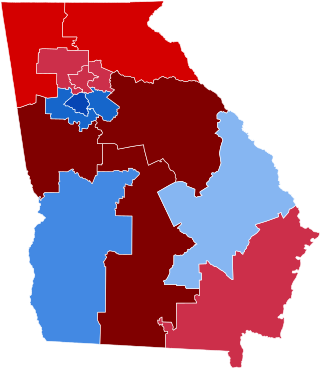
The 1792 United States presidential election was the second quadrennial presidential election. It was held from Friday, November 2, to Wednesday, December 5, 1792. Incumbent President George Washington was elected to a second term by a unanimous vote in the electoral college, while John Adams was re-elected as vice president. Washington was essentially unopposed, but Adams faced a competitive re-election against Governor George Clinton of New York.

The 2nd United States Congress, consisting of the United States Senate and the United States House of Representatives, met at Congress Hall in Philadelphia, Pennsylvania, from March 4, 1791, to March 4, 1793, during the third and fourth years of George Washington's presidency. The apportionment of seats in the House of Representatives was based on the provisions of Article I, Section 2, Clause 3 of the United States Constitution. Additional House seats were assigned to the two new states of Vermont and Kentucky. Both chambers had a Pro-Administration majority.

The 3rd United States Congress was a meeting of the legislative branch of the United States federal government, consisting of the United States Senate and the United States House of Representatives. It met at Congress Hall in Philadelphia, Pennsylvania from March 4, 1793, to March 4, 1795, during the fifth and sixth years of George Washington's presidency.

The 1988 United States House of Representatives elections was an election for the United States House of Representatives in November 8, 1988, to elect members to serve in the 101st United States Congress. They coincided with the election of George H. W. Bush as president. Although Bush won with a strong majority, his Republican Party lost a net of two seats to the Democratic Party, slightly increasing the Democratic majority in the House. It was the first time since 1960 that an incoming president's party lost seats in the House.

The 1792–93 United States House of Representatives elections were held on various dates in various states between August 27, 1792 and September 6, 1793. Each state set its own date for its elections to the House of Representatives before the first session of the 3rd United States Congress convened on December 2, 1793. With the addition of the new state of Kentucky's representatives, and the congressional reapportionment based on the 1790 United States Census, the size of the House increased to 105 seats.

The 1790–91 United States House of Representatives elections were held on various dates in various states between April 27, 1790, and October 11, 1791. Each state set its own date for its elections to the House of Representatives before the first session of the 2nd United States Congress convened on October 24, 1791. This was the first midterm election cycle, which took place in the middle of President George Washington's first term. The size of the House increased to 67 seats after the new state of Vermont elected its first representatives.

The 1788–89 United States House of Representatives elections were the first U.S. House of Representatives elections following the adoption of the Constitution of the United States. Each state set its own date for its congressional elections, ranging from November 24, 1788 to March 5, 1789, before or after the first session of the 1st United States Congress convened on March 4, 1789. They coincided with the election of George Washington as the first president of the United States.

James Jackson was an early British-born Georgia politician of the Democratic-Republican Party. He was a member of the U.S. House of Representatives from 1789 until 1791. He was also a U.S. Senator from Georgia from 1793 to 1795, and from 1801 until his death in 1806. In 1797 he was elected 23rd Governor of Georgia, serving from 1798 to 1801 before returning to the senate.

The 2004 United States Senate election in Georgia took place on November 2, 2004, alongside other elections to the United States Senate in other states as well as elections to the United States House of Representatives and various state and local elections. Incumbent Democratic U.S. Senator Zell Miller decided to retire instead of seeking a first full term in office, leaving an open seat.

The 1792–93 United States Senate elections were held on various dates in various states, coinciding with President George Washington's unanimous re-election. As these U.S. Senate elections were prior to the ratification of the Seventeenth Amendment in 1913, senators were chosen by state legislatures. Senators were elected over a wide range of time throughout 1792 and 1793, and a seat may have been filled months late or remained vacant due to legislative deadlock. In these elections, terms were up for the ten senators in Class 2.

The 1793 United States House of Representatives elections in New York were held in January 1793, to elect 10 U.S. Representatives to represent the State of New York in the United States House of Representatives.

The 1794 United States House of Representatives elections in New York were held on December 12, 1794, to elect ten United States Representatives to represent the State of New York in the United States House of Representatives of the 4th United States Congress.

The 2012 United States House of Representatives elections in Georgia were held on Tuesday, November 6, 2012, and elected the 14 U.S. Representatives from the state, one from each of the state's 14 congressional districts, an increase of one seat following the 2010 United States Census. The elections coincided with the elections of other federal and state offices, including a quadrennial presidential election. The party primary elections were held on July 31, 2012, and the run-off on August 21, 2012.

Following the 1790 census, Georgia's apportionment was decreased from 3 seats to 2. Georgia switched from separate districts to at-large seats.

A special election was held in Georgia's 1st congressional district on October 1, 1827 to fill a vacancy left by the resignation of Edward F. Tattnall (J) prior to the start of the 20th Congress.

A special election was held in Georgia's 2nd congressional district in 1827 to fill a vacancy caused by the resignation of John Forsyth (J).

The 1792 United States elections elected the members of the 3rd United States Congress. Congress was broadly divided between a Pro-Administration faction supporting the policies of George Washington's administration and an Anti-Administration faction opposed to those policies. Due to this, the Federalist Party and the Democratic-Republican Party were starting to emerge as the distinct political parties of the First Party System. In this election, the Pro-Administration faction maintained control of the Senate, but lost its majority in the House.

Following is a table of United States presidential elections in Georgia, ordered by year. Since its admission to statehood in 1788, Georgia has participated in every U.S. presidential election except the election of 1864, when it had seceded in the American Civil War.

The 2018 United States House of Representatives elections in Georgia were held on November 6, 2018, to elect the fourteen U.S. representatives from the state of Georgia, one from each of the state's fourteen congressional districts. The elections coincided with a gubernatorial election, as well as other elections to the House of Representatives, elections to the United States Senate, and various state and local elections. The primary elections took place on May 22, 2018.

The 2010 Georgia House of Representatives elections occurred on November 2, 2010 to elect the members to the Georgia House of Representatives. All 180 seats in the state House were up for two year terms. The winners of this election cycle served in the 151st Georgia General Assembly. It was the last election to the House prior to the 2010 redistricting cycle based on the 2010 United States census.














